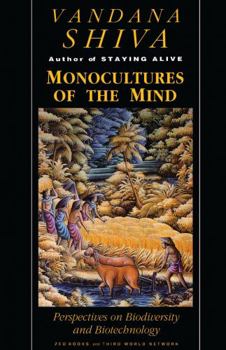Monocultures of the Mind: Perspectives on Biodiversity and Biotechnology
Select Format
Select Condition 
Book Overview
Vandana Shiva has established herself as a leading independent thinker and voice for the South in that critically important nexus where questions of development strategy, the environment and the position of women in society coincide. In this new volume, she brings together her thinking on the protection of biodiversity, the implications of biotechnology, and the consequences for agriculture of the global pre-eminence of Western-style scientific knowledge.
Format:Paperback
Language:English
ISBN:1856492184
ISBN13:9781856492188
Release Date:February 1993
Publisher:Bloomsbury Publishing PLC
Length:184 Pages
Weight:0.60 lbs.
Dimensions:0.4" x 5.7" x 8.2"
Customer Reviews
4 ratings
BUY THE BOOK
Published by Thriftbooks.com User , 15 years ago
I purchased the book after watching some of her lectures/talks. She repeatedly makes reference to the "monoculture" attitude. This attitude is truly an important concept to improve your critical thinking and, therefore, decision making skills. This shift in perspective provides one with some of the foundations required for independent and intelligent thinking. This book should be purchased and read not simply for the content, but also for the methods of thought employed to explain the core ideas of the book. Those of you who find Charlie Munger interesting should find Vandana Shiva right up your alley due to her multi-perspective/disciplinary independent thinking. Also, it gives you glimpses of history that have either been forgotten or glossed over. This too will add to your ability to look at international events... or even simply teach you how to interpret news stories or articles. BUY IT.
Very challenging and inspiring
Published by Thriftbooks.com User , 20 years ago
This book zeroes in on possibly the core issue of progress as we know it. In maximizing certain kinds of production, we are systematically "weeding out" other kinds of life. Shiva conducts a whirlwind tour of what this means for agriculture, biodiversity, the economy, politics, and human values. What do we have when only certain types of plants and people are valued? I found this a very challenging and inspiring piece of work. -author of The Gardens of Their Dreams
Change the mono-minds
Published by Thriftbooks.com User , 24 years ago
Vandana Shiva's books are essential reading for anybody who wants to explore seriously the impact of biotechnology on the so-called "third world"; on their food production, their environment, and the disappearing biodiversity of their traditional food crops. It is easy to find books that claim biotechnology is the answer to the developing world's woes. It's much more difficult to find considered and well researched investigations from southern experts and scientists on the challenges the "benefits" of biotechnology are bringing to their cultures. MONOCULTURES OF THE MIND is a collection of essays representing such a "southern" scientist's vital perspective. Shiva makes provocative contributions in the ever expanding debate around what (and who) will feed future generations of humans in the developing world. She argues that a mono-agriculture society - where trees are seen as nothing more than timber and crop yield is the only measure for economic value of cereals - reflects a mental and political system that will lack in vision and complexity in general. However, diverse knowledge systems are necessary to address the challenges ahead of us. For example, in traditional societies, trees have multiple purposes, from food, water reservoir and shelter to nutrients of the soil around them. Timber value is only one (small) part of the whole. Traditional knowledge systems contribute in major ways to the understanding of biodiversity, ecological sustainability and cultural, including agri-cultural, diversity. Vandana Shiva is a geneticist as well as an environmentalist and her expertise comes to the fore in her analysis of threats to biodiversity and the dramatic loss of species and varieties in modern times. She also reviews various negative impacts posed by biotechnology on fragile southern ecosystems and the dangers to southern economies. You don't have to agree with all of Vandana Shiva's views, BUT, you should read some of her books for what she has to say and what she represents. MONOCULTURES is a good starting point.
interesting
Published by Thriftbooks.com User , 25 years ago
The book was somewhat interesting. It doesnot really reflect what she wanted to say





